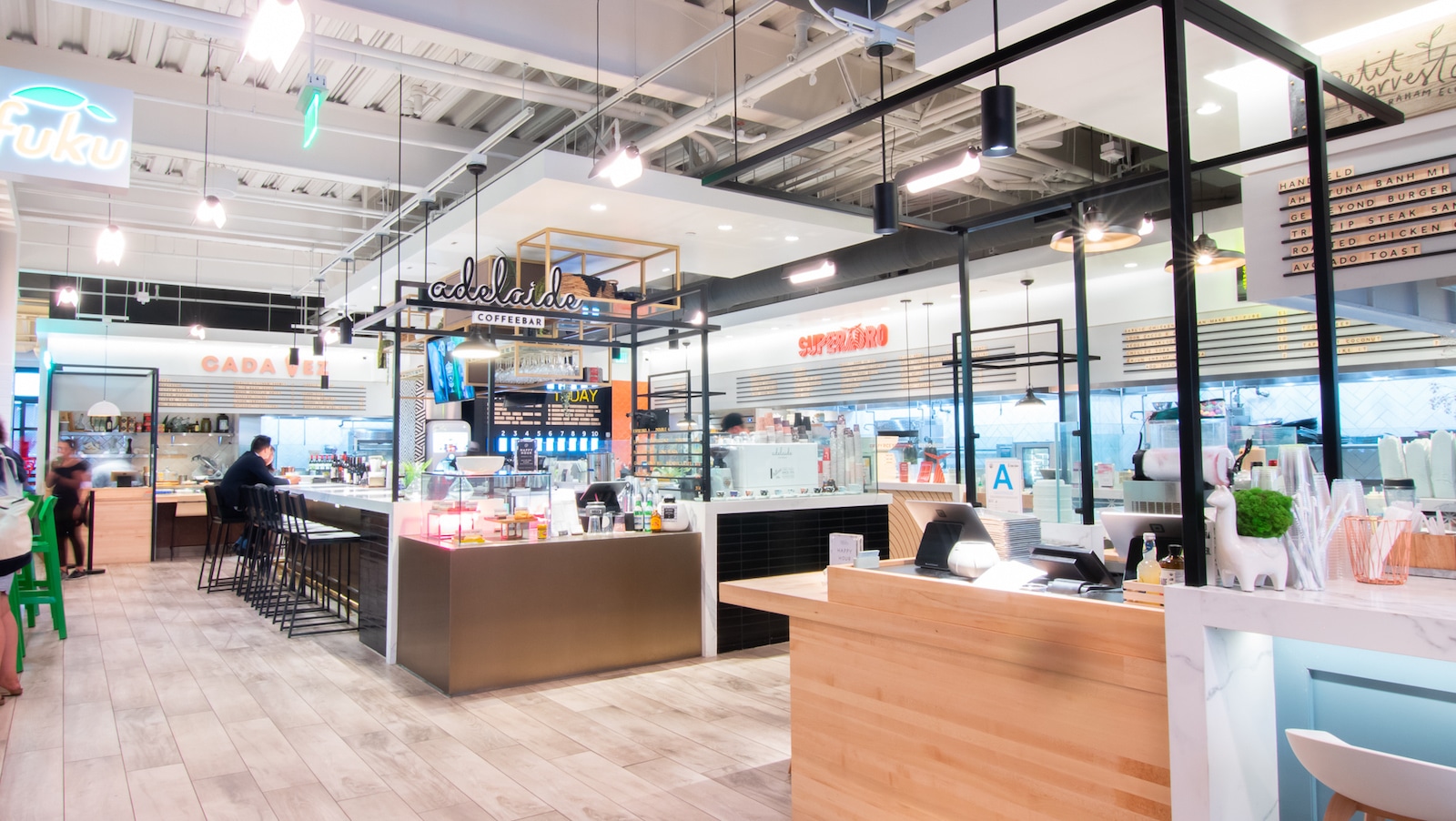Food halls took off in the last few years as a source for high-quality eats in a community-focused environment. But the outbreak of COVID-19 and the social distancing that ensued—along with governmental mandates to shut down dining rooms—took one of food halls’ strongest attributes away in their social experience.
That hasn’t meant that food halls are giving up. Just like other restaurant concepts, food halls have adapted to the new realities posed by coronavirus and shifted their business models to accommodate. For example, the Politan Group, which owns five food halls around the U.S.—St. Roch Market and Auction House Market in New Orleans and Politan Row in Miami, Chicago, and Houston—pivoted to a short-term ghost kitchen model for any vendors who were interested in participating. Legacy Hall in Dallas likewise leaned into an off-premises structure with walk-up to-go orders and newly developed delivery via Grubhub. Legacy Hall also developed curbside “quarantine kits,” with its vendors offering meal kits with select menu options at a flat rate; some celebrity-chef partners have even participated, including Tiffany Derry and Kevin Sbraga.
SocialEats in Santa Monica, California, is also stepping up its efforts outside the four walls in an effort to keep the business running. John Kolaski, CEO and founder of SocialEats parent K2 Restaurants, says the food hall has quickly adapted to all of the necessary precautions for preventing the spread of COVID-19. It stopped allowing guests to walk through the hall, and closely controlled the food production areas to ensure they were kept sanitary.
“We’ve had to pivot five or six different times just to be able to keep up with the changes from what’s coming from our government on through to the health department on through to adjusting to what we needed to with our staff and with our guests to ensure that everyone that is here or everyone that wants to come into here is safe,” Kolaski says.
But keeping up sales without guests walking through the hall was a new experience for SocialEats. Kolaski says the team ramped up its carryout and delivery offerings. While SocialEats participates in third-party delivery services, he says, it also committed to in-house delivery because it helped keep some of the team members employed.
Eventually, SocialEats also took a page out of the quick-service playbook.
“We’ve built out our own modified drive thru,” Kolaski says. “If [guests] order on our online store or call into us, we set up the food and to-go packaging, and they just give us a call when they’re sitting in our back loading zone. We’ve got the old car-hop spots lined up and chalked out, and can just pull in and they call us and we run the food and drinks out to them.”
One problem experienced by many full-service restaurants and other operators unaccustomed to off-premises channels is that their regular guests may not know if and when they make those channels available in a socially distanced world. Kolaski says SocialEats pushed news of its off-premises opportunities via the standard social media and email networks, but it also relied upon some old-fashioned on-the-ground marketing. Team members walked around the community sharing takeout menus with instructions for ordering.
“If we’re doing something super cool and nobody knows about it, does it matter?” Kolaski says.
K2 partners with some well-known operators to serve as its vendors, including David Chang and his chicken-sandwich concept Fuku, as well as Bryan and Michael Voltaggio and their fish-based fast casual STRFSH. Kolaski says he’s able to learn from partners like them in developing best practices for times like this.
Still, while the vendors may be external partners with other locations and concepts, Kolaski says SocialEats has an advantage that several food halls do not—one that helps in times of crisis and unpredictability. “Since K2 Restaurants manages all of the different concepts, we’re able to provide the underlying support that I think we noticed that food halls didn’t have,” he says.
Kolaski believes this season will teach K2 how to be more efficient in its kitchen, operations, and team management. And he thinks these months will also be telling for food halls; he predicts there will be a lot of consolidation among food-hall properties, and that food-hall developers will begin looking for single operators to run the show at their halls.
“I think for a food hall to survive,” he says, “it’s going to have to rely on a smaller mix of operators and tenants in order to have that support and really be able to ensure that it can flex through opportunities that exist like this right now.”
For more insights from Kolaski on how SocialEats is surviving through the coronavirus, stream the podcast above.




